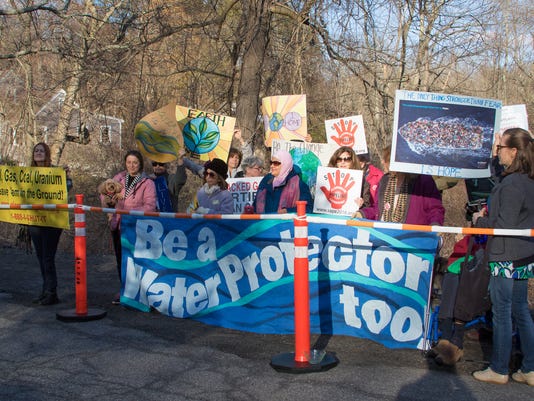 AIM gas pipeline opponents lose legal challenge, may appeal
AIM gas pipeline opponents lose legal challenge, may appeal
Thomas C. Zambito, Rockland/Westchester Journal News
Opponents of the AIM pipeline expansion say they may refocus their legal challenges on the next phase of the project
The U.S. Court of Appeals for the District of Columbia, in a July 27 decision, sided with the Federal Energy Regulatory Commission (FERC) in turning back a legal challenge to the Algonquin Incremental Market (AIM) pipeline expansion.
The Hudson Valley environmental group Riverkeeper claimed the installation of 2,159 feet of natural gas pipeline across from Indian Point posed a serious threat to public safety, particularly if the pipeline ruptured.
Riverkeeper spokesman Cliff Weathers said a decision to appeal has not been made yet.
But Courtney Williams, who heads the grassroots group SAPE (Stop the Algonquin Pipeline Expansion), said the opposition may focus its future legal challenges on the next phase of the expansion, known as the Atlantic Bridge Project.
“We’re still in discussions with Riverkeeper to determine whether we will appeal this portion of the decision,” Williams said. “But the legal challenge to Atlantic Bridge is already underway.”
Another challenge coming
SAPE joined Riverkeeper, the City of Boston and others in challenging FERC’s decision-making process.
Opponents argued that FERC should have considered the environmental impacts of all three phases of the expansion, including the Atlantic Bridge Project, as one. But the appeals court sided with FERC. “We find no basis to set aside the Commission’s order on those grounds,” the appeals court wrote.
The Atlantic Bridge Project is an extension of the Algonquin pipeline that runs through Yorktown and Somers in northern Westchester before heading into Putnam County and Connecticut.
It is part of a $972 million expansion that will make it possible for the pipeline’s current owner, Enbridge Energy Partners, to deliver natural gas to New England from Pennsylvania, by way of a pipeline that cuts through New Jersey and New York.
The project has impacted several Hudson Valley towns in Putnam, Rockland and Westchester counties and touched off a number of public demonstrations. In 2016, several protesters were arrested after locking themselves inside a section of pipeline in Verplanck while it was being readied to be installed under the Hudson River.
SAPE has staged protests outside Gov. Andrew Cuomo’s New Castle home, urging the governor to shut down the pipeline. And last month at a rally in Peekskill, Cynthia Nixon, Cuomo’s opponent in the September Democratic primary, accused the governor of moving too slowly to address the opposition's concerns.
NRC signs off on plan
The appeals court ruling said FERC’s decision allowing the pipeline near Indian Point was supported by an analysis by the Nuclear Regulatory Commission (NRC), which the commission found "persuasive."
NRC’s review determined that Indian Point’s two reactors could safely operate or temporarily shut down if a gas line ruptured near the plant.
FERC’s 2015 ruling credited NRC’s expertise in assessing safety threats to nuclear facilities.
“We see no basis to reject the Commission’s to do so,” the appeals court wrote.
The
NRC said it could re-evaluate its decision after Indian Point’s owner,
Louisiana-based Entergy, submits a plan for how the plant will be
dismantled. Entergy has plans to shut down the Buchanan plant by 2021.
Read or Share this story: https://www.lohud.com/story/news/investigations/2018/08/14/algonquin-gas-pipeline/978104002/
No comments:
Post a Comment